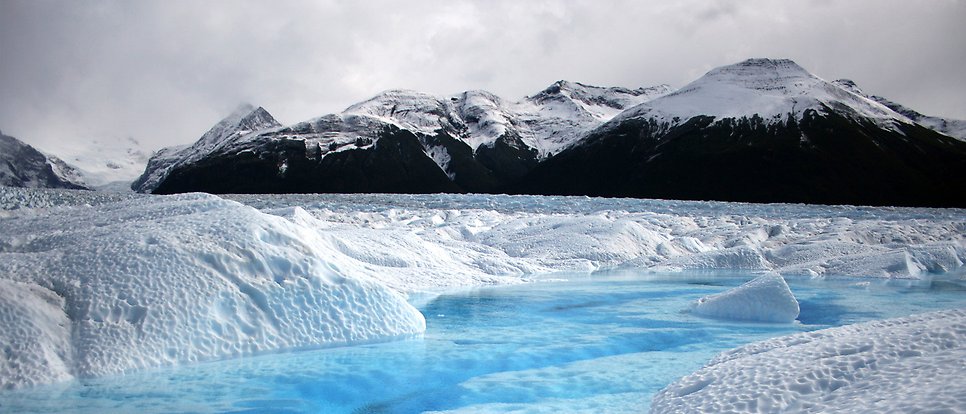Master's Programme in Earth Science – Physical Geography
120 credits

Do you want to learn about how the Earth's surface has evolved over time, or how it is influenced by environmental changes? Do you want to work with analyses of nature's own archives to understand these changes? In the Master's Programme in Earth Science, specialising in Physical Geography, you study Earth processes that change and shape the Earth's surface through interaction with the climate and the environment over different time scales.
Autumn 2023 Autumn 2023, Uppsala, 100%, On-campus, English
- Location
- Uppsala
- Pace of study
- 100%
- Teaching form
- On-campus
- Instructional time
- Daytime
- Start date
- 28 August 2023
- Language of instruction
- English
- Entry requirements
-
Academic requirements
A Bachelor's degree, equivalent to a Swedish Kandidatexamen, from an internationally recognised university.
Also required is 90 credits in earth science.
Language requirements
Proficiency in English equivalent to the Swedish upper secondary course English 6. This requirement can be met either by achieving the required score on an internationally recognised test, or by previous upper secondary or university studies in some countries. Detailed instructions on how to provide evidence of your English proficiency are available at universityadmissions.se.
- Selection
-
Students are selected based on an overall appraisal of previous university studies, a statement of purpose and other relevant experience.
- Fees
-
If you are not a citizen of a European Union (EU) or European Economic Area (EEA) country, or Switzerland, you are required to pay application and tuition fees.
- First tuition fee instalment: SEK 72,500
- Total tuition fee: SEK 290,000
- Application deadline
- 16 January 2023
- Application code
- UU-M1852
- Additional information
-
In addition to the general supporting documents, you also need to submit a programme-specific statement of purpose (1 page).
The statement of purpose should provide a clear motivation for the chosen programme and specialisation; include information on your Bachelor's thesis (if any) and its relevance to the programme; and describe other relevant experience, e.g. fieldwork, internships, work experience, previous studies abroad, involvement in a student union or academic societies, communication skills.
Check the application guide for information on how to apply and what other supporting documents you need to submit.
Autumn 2024 Autumn 2024, Uppsala, 100%, On-campus, English
- Location
- Uppsala
- Pace of study
- 100%
- Teaching form
- On-campus
- Instructional time
- Daytime
- Start date
- 2 September 2024
- Language of instruction
- English
- Entry requirements
-
Academic requirements
A Bachelor's degree, equivalent to a Swedish Kandidatexamen, from an internationally recognised university.
Also required is 90 credits in earth science.
Language requirements
Proficiency in English equivalent to the Swedish upper secondary course English 6. This requirement can be met either by achieving the required score on an internationally recognised test, or by previous upper secondary or university studies in some countries. Detailed instructions on how to provide evidence of your English proficiency are available at universityadmissions.se.
- Selection
-
Students are selected based on an overall appraisal of previous university studies, a statement of purpose and other relevant experience.
- Fees
-
If you are not a citizen of a European Union (EU) or European Economic Area (EEA) country, or Switzerland, you are required to pay application and tuition fees.
- First tuition fee instalment: SEK 72,500
- Total tuition fee: SEK 290,000
- Application deadline
- 15 January 2024
- Application code
- UU-M1852
- Additional information
-
In addition to the general supporting documents, you also need to submit a programme-specific statement of purpose (1 page).
The statement of purpose should provide a clear motivation for the chosen programme and specialisation; include information on your Bachelor's thesis (if any) and its relevance to the programme; and describe other relevant experience, e.g. fieldwork, internships, work experience, previous studies abroad, involvement in a student union or academic societies, communication skills.
Check the application guide for information on how to apply and what other supporting documents you need to submit.
About the programme
The specialisation in Physical Geography has a focus on environmental change and landscape development over different scales in time and space, but also on how glaciers and ice sheets work and their role in Earth's systems. The programme combines courses in glaciology, geomorphology and environmental and climate change with methodological courses such as GIS and field methods.
During the programme, you can expect to:
- Investigate glaciology, geomorphology and climate change with methodological courses such as GIS and field methods.
- Understand how the climate and environment have changed from both quantitative and qualitative analyses of nature's archives.
- Learn about human-Earth interaction and the impacts of natural hazards.
The Department of Earth Sciences at Uppsala University is one of the most comprehensive academic departments of its kind in Europe. Research in Earth science focuses on subjects that range from the Earth's core to the atmosphere. It focuses on scales from sub-microscopic minerals and fossils to the formation of mountains and oceans, and in time from the formation of the Earth to the processes currently reshaping the planet.
Research in Physical Geography at the Department is oriented towards glacial processes and the link between glaciers and the climate system, but also environmental change and geochemical cycles.
Degree
The programme leads to the degree of Master of Science (120 credits) with Earth Science as the main field of study. After one year of study, it is possible to obtain a degree of Master of Science (60 credits).
Content
The first semester starts with the course Dynamics of Earth Systems - Global Change, which provides a chance to explore interactions between Earth systems and how they change with time, which is further developed in Climate variations. Method courses are also offered from the first semester with Applied geoinformatics and Statistical and Data analysis. The Presentation and Publication course helps you to develop your communication skills.
The second semester focuses on glaciology and glacial processes and geomorphology, together with a course in field techniques and methods.
The third semester offers courses on environmental change over geological time scales, water and society and current research topics within physical geography and hydrology. These courses are followed by courses on snow physics and hydrology and natural hazards.
The fourth and final semester of the specialisation is a degree project in the form of an independent project.
Courses within the programme
Learning experience
The teachers in the Master's Programme in Earth Science are experts in their respective fields, giving you up-to-date contact with front-line research in an open and creative educational atmosphere. The teaching consists of a balanced mix of theoretical and practical work providing experience in both research and industry-oriented applications. Excursions, fieldwork and study visits are included in some courses.
Instruction in the Master's programme builds on your experience and knowledge from your previous education. You are expected to actively participate and contribute to the learning environment and take responsibility for your own and others' learning. The teachers are responsible for creating opportunities for active learning at individual and group level. Purposeful and respectful dialogue between teachers and students contributes to the constant improvement and development of courses.
Examination generally includes written exams, complemented by seminar presentations/discussions, project work, laboratory work and field reports.
Career
The Master's Programme in Earth Science, specialising in Physical Geography, prepares you with skills and knowledge for a career in the field of management of the environment within private and governmental organisations.
Our graduates work at, for example, Berg AB, Sweco AB and Tyréns AB. Job titles include Geochemist, Consultant, Geoscientist, etc.
The programme also provides good opportunities for postgraduate education with subsequent research careers.
Career support
During your time as a student, UU Careers offers support and guidance. You have the opportunity to take part in a variety of activities and events that will prepare you for your future career.
Is this programme right for you?
Read interviews about the programme.

What people say about the programme
Watch our programme video.

Register your interest
Keep updated about the application process.

Programme syllabus
- Programme syllabus valid from Autumn 2024
- Programme syllabus valid from Autumn 2023
- Programme syllabus valid from Autumn 2022
- Programme syllabus valid from Autumn 2021
- Programme syllabus valid from Autumn 2020
- Programme syllabus valid from Autumn 2019
- Programme syllabus valid from Autumn 2018
- Programme syllabus valid from Autumn 2017
- Programme syllabus valid from Autumn 2016, version 2
- Programme syllabus valid from Autumn 2016, version 1
- Programme syllabus valid from Autumn 2015
- Programme syllabus valid from Autumn 2014
- Programme syllabus valid from Autumn 2013
- Programme syllabus valid from Autumn 2012
Outline
- Outline valid from Autumn 2024
- Outline valid from Autumn 2023
- Outline valid from Autumn 2022
- Outline valid from Autumn 2021
- Outline valid from Autumn 2020
- Outline valid from Autumn 2019
- Outline valid from Autumn 2018, version 2
- Outline valid from Autumn 2018, version 1
- Outline valid from Autumn 2017, version 2
- Outline valid from Autumn 2017, version 1
- Outline valid from Autumn 2016, version 2
- Outline valid from Autumn 2016, version 1
- Outline valid from Autumn 2015
- Outline valid from Autumn 2014
- Outline valid from Autumn 2013
- Outline valid from Autumn 2012
Contact
- For programme-specific information, please contact our study counsellor:
- studievagledare@geo.uu.se
- +46 18 471 25 07
- For admissions-related or general information, please contact our applicant support team:
- masterprogrammes@uu.se
- Programme Director Abigail Barker:
- abigail.barker@geo.uu.se
- +46 18 471 25 52
Students
As a student you will find information about your studies in the student gateway.
